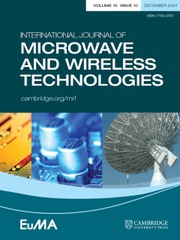Automated extraction of device noise parameters based on multi-frequency, source-pull data
Published online by Cambridge University Press: 10 September 2013
Abstract
In this paper a novel approach for determining the four noise parameters of FET devices over frequency is presented. Such methodology is made of two parts: the first one allows to straightforwardly extract single-frequency noise parameters from source-pull data; the second one extends this capability to multi-frequency, source-pull data to obtain a full description of device noise behavior over frequency by means of at most 10 constant parameters (depending on the required accuracy). The whole process is automated via a software routine and does not need a previous knowledge of the FET equivalent circuit's topology, or the values of its elements. This peculiarity makes the proposed method very well suited to quick characterization campaigns of active devices, avoiding the burden of a whole set of prior, different measurements and the relevant, critical extraction procedures, which are strongly dependent on the device.
- Type
- Research Papers
- Information
- International Journal of Microwave and Wireless Technologies , Volume 6 , Issue 1: IJMWT Special Issue on the 2013 National Microwave Days in France , February 2014 , pp. 63 - 72
- Copyright
- Copyright © Cambridge University Press and the European Microwave Association 2013
References
- 6
- Cited by


